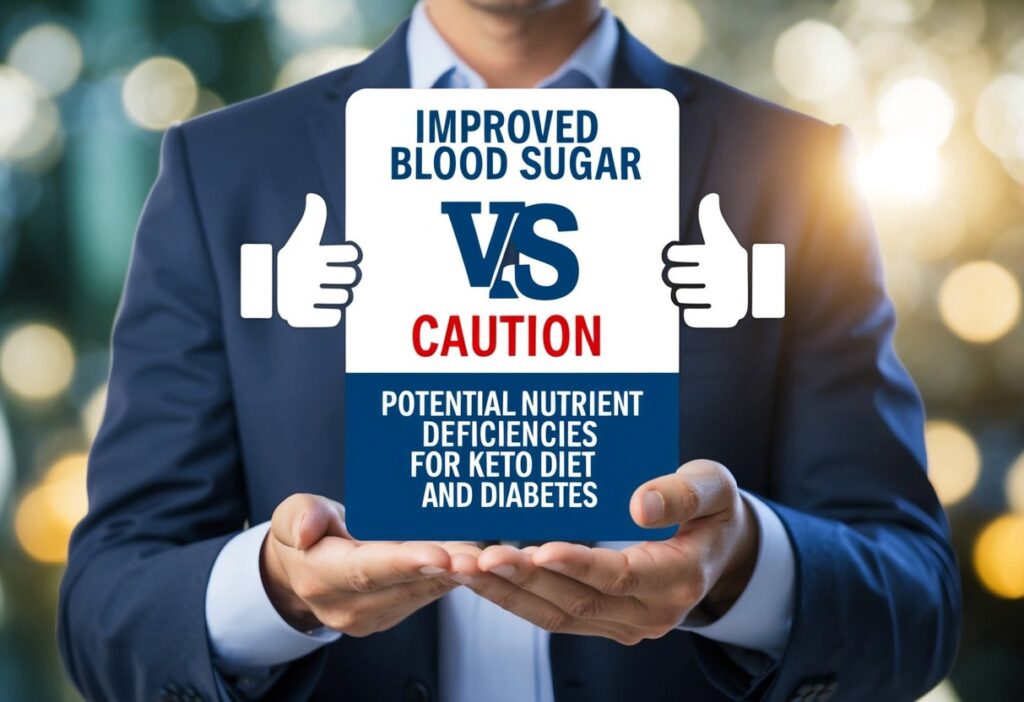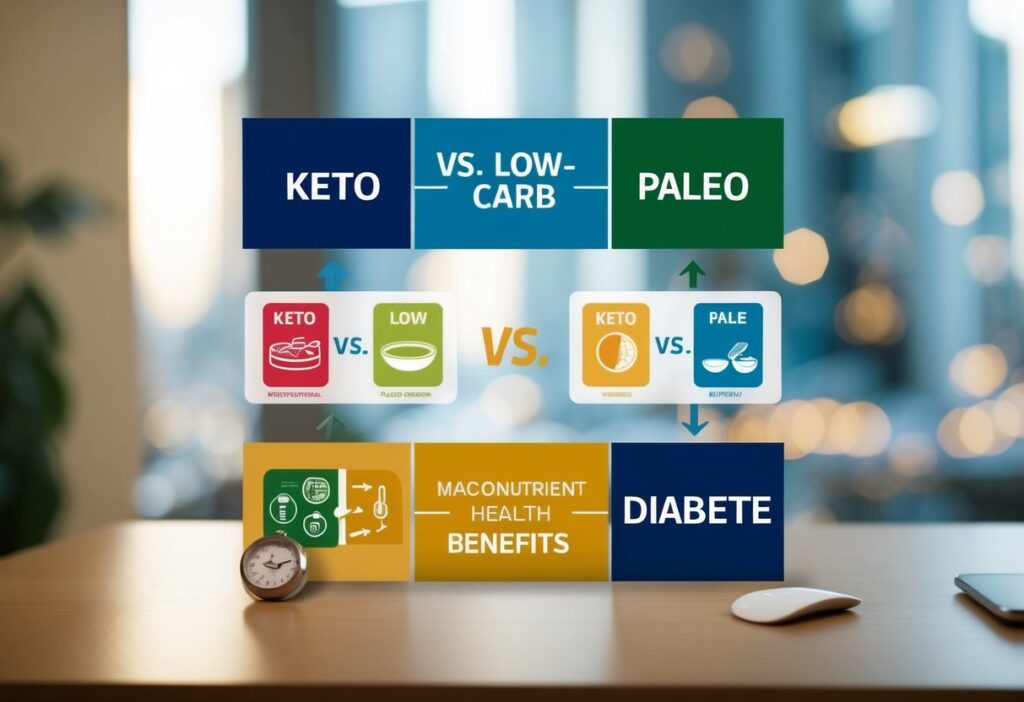Can Keto Reverse Diabetes? Discover the Science and Success Stories Behind This Controversial Diet!
This post may contain affiliate links. If you purchase through these links, I may earn a small commission at no extra cost to you. LEARN MORE.
In recent years, the ketogenic diet has sparked heated debates about its potential to reverse diabetes. As more individuals seek effective alternatives to traditional diabetes management, the keto approach—high in fats and low in carbohydrates—has emerged as a compelling contender.
But can this controversial diet truly change the lives of those living with diabetes? In this article, we delve into the latest scientific findings and real-life success stories that illuminate the connection between the keto diet and diabetes reversal.

Join us on a journey through groundbreaking research, personal testimonials, and expert insights that challenge conventional wisdom and inspire hope.
Whether you’re diabetic or seeking knowledge, discover the possibilities that the keto lifestyle might hold for improving insulin sensitivity and achieving better overall health.
Looking for a structured keto meal plan? Check out our 7-Day Custom Keto Meal Plan for a hassle-free start!
Discover how keto can improve your health—try the Custom Keto Diet Plan designed for your needs!
Understanding Diabetes: Types and Mechanisms

Diabetes is a chronic condition affecting millions worldwide, characterized by elevated blood sugar levels due to the body’s inability to produce or effectively use insulin. There are two primary types of diabetes: Type 1 and Type 2.
- Type 1 diabetes is an autoimmune condition where the immune system mistakenly attacks insulin-producing beta cells in the pancreas, resulting in little to no insulin production. Individuals with Type 1 diabetes require external insulin to regulate blood glucose levels.
- Type 2 diabetes, often linked to lifestyle factors, occurs when the body becomes resistant to insulin or fails to produce enough of it. This leads to increased blood sugar levels and, over time, severe complications such as cardiovascular disease, nerve damage, kidney failure, and vision problems.
Traditional diabetes management strategies include medication, lifestyle modifications, and dietary changes. However, emerging evidence suggests that the ketogenic diet may provide an alternative approach to managing and potentially reversing Type 2 diabetes.
New to keto? Our Beginner’s Guide to Keto breaks it down step by step.
What is the Keto Diet? Key Principles and Components

The ketogenic diet (keto diet) is a high-fat, low-carbohydrate eating plan designed to shift the body’s metabolism from glucose dependency to fat utilization for energy. This metabolic state, known as ketosis, occurs when carbohydrate intake is drastically reduced, prompting the liver to produce ketones from stored fat as an alternative energy source.
Key principles of the keto diet:
- Macronutrient ratio: Typically consists of 70-75% fat, 20-25% protein, and 5-10% carbohydrates.
- Carbohydrate restriction: Usually limited to 20-50 grams per day.
- Food choices: Emphasizes healthy fats (avocados, nuts, seeds, oils, butter, fatty fish), moderate protein (meat, poultry, eggs), and non-starchy vegetables (leafy greens, broccoli, cauliflower).
By significantly reducing carbohydrate intake, the keto diet minimizes glucose fluctuations, reduces insulin demand, and stabilizes blood sugar levels. These effects make it a promising dietary intervention for individuals with diabetes.
Learn more about the fundamentals in our Keto Diet for Beginners: Easy Tips to Kickstart Your Journey.
The Science Behind Keto and Blood Sugar Control

Scientific research has explored the relationship between the ketogenic diet and blood sugar control. The diet’s primary benefit lies in its ability to minimize carbohydrate intake, thereby preventing spikes in blood glucose levels and reducing insulin resistance.
Scientific Evidence Supporting Keto for Diabetes
- A study published in Diabetes Therapy found that individuals with Type 2 diabetes who followed a ketogenic diet for 32 weeks experienced significant reductions in fasting blood glucose levels, hemoglobin A1c (HbA1c), and body weight compared to those on a standard diet.
- Another study in Nutrition & Metabolism showed that ketogenic diets improved insulin sensitivity and led to a greater reduction in diabetes medications.
- Research indicates that weight loss, which frequently occurs on a keto diet, plays a crucial role in improving insulin sensitivity and lowering the risk of diabetes-related complications.
By reducing insulin demand, the keto diet allows the pancreas to function more efficiently and helps regulate glucose levels more effectively.
For more detailed strategies, see How Intermittent Fasting Works with Keto to Accelerate Fat Loss.
How Keto Affects Insulin Sensitivity

Insulin sensitivity refers to how effectively the body’s cells respond to insulin. Insulin resistance, a hallmark of Type 2 diabetes, occurs when the body’s cells do not respond properly to insulin, causing blood sugar levels to rise.
The keto diet enhances insulin sensitivity through several mechanisms:
- Weight Loss: Excess body fat, particularly visceral fat, contributes to insulin resistance. By promoting fat loss, keto improves insulin function.
- Reduced Inflammation: Chronic inflammation is a major factor in insulin resistance. Studies show that keto lowers inflammatory markers, potentially improving glucose metabolism.
- Lower Triglycerides: High triglyceride levels are associated with insulin resistance. Keto diets have been shown to significantly reduce triglycerides, improving metabolic health.
These combined effects make the keto diet an attractive approach for managing diabetes and potentially reversing Type 2 diabetes.
For a deeper dive, check out When Does the Keto Diet Start Working? Unlocking Speedy Fat Loss Results.
Success Stories: Real-Life Experiences of Keto Reverse Diabetes

Many individuals have experienced remarkable improvements in their diabetic condition through the keto diet. Here are a few notable success stories:
Dr. Sarah Hallberg
Dr. Hallberg, a physician specializing in diabetes reversal, adopted the keto diet herself and saw substantial weight loss and normal blood sugar levels without medication. She later implemented the approach in her medical practice, helping many patients reverse their diabetes.
Doug Reynolds
Doug, the founder of Low Carb USA, was diagnosed with Type 2 diabetes and struggled with blood sugar control. After adopting the keto diet, he lost over 80 pounds, normalized his blood sugar, and effectively reversed his diabetes.
These and many other success stories demonstrate the potential of the keto diet to transform lives, providing an alternative approach to diabetes management.
Read more inspiring stories in our Breaking Through Keto Plateaus: Advanced Strategies to Restart Your Weight Loss Journey.
Ready to start your keto journey? Follow a Tailored Keto Plan that’s helped others achieve success!
Potential Risks and Considerations of the Keto Diet for Diabetics

While the keto diet has promising benefits for diabetes, it also presents some challenges and risks, particularly for individuals requiring medication adjustments.
Potential Risks
- Hypoglycemia (Low Blood Sugar): Reducing carbohydrate intake and insulin dependence can cause blood sugar to drop too low, leading to dizziness, confusion, and fainting.
- Nutrient Deficiencies: The restrictive nature of keto may lead to insufficient intake of fiber, potassium, magnesium, and B vitamins. Eating nutrient-dense vegetables and taking supplements may help mitigate this risk.
- Cholesterol and Heart Health: While keto can improve HDL (good cholesterol), it may increase LDL (bad cholesterol) in some individuals. Regular monitoring is essential.
- Adherence Challenges: The keto diet requires strict adherence, making it difficult for some individuals to maintain long-term.
Who Should Avoid Keto?
- Individuals with Type 1 Diabetes: Keto may increase the risk of diabetic ketoacidosis (DKA), a life-threatening condition.
- Those with kidney disease: The high protein intake could strain kidney function.
- Pregnant or breastfeeding women: Keto may affect nutrient availability for the baby.
To ensure safety, diabetics considering keto should consult a healthcare provider before making drastic dietary changes.
For precautions and guidance, refer to Avoid Mistakes on the Custom Keto Diet Tips.
Expert Opinions: What Healthcare Professionals Say About Keto and Diabetes

Healthcare professionals have varied opinions on the ketogenic diet’s role in diabetes management, reflecting the need for individualized approaches to treatment.
While some experts advocate for the diet’s potential benefits, others caution against its long-term use without careful monitoring and consideration of individual health needs.
Dr. Eric Westman, an obesity medicine specialist and associate professor of medicine at Duke University, is a prominent advocate of the ketogenic diet for diabetes management. Dr. Westman has conducted extensive research on low-carbohydrate diets and has seen firsthand the positive impact of the keto diet on his patients. He emphasizes that the diet can lead to significant improvements in blood sugar control, weight loss, and overall metabolic health, particularly for individuals with Type 2 diabetes.
Dr. Westman recommends that individuals work closely with their healthcare provider to tailor the diet to their specific needs and ensure proper monitoring.
On the other hand, some healthcare professionals express concerns about the long-term sustainability and potential risks of the ketogenic diet.
Dr. Neal Barnard, president of the Physicians Committee for Responsible Medicine, cautions against high-fat diets, including keto, due to potential negative effects on heart health and the risk of nutrient deficiencies.
Dr. Barnard advocates for a plant-based, low-fat diet, which has also shown benefits for diabetes management and overall health. He emphasizes the importance of a balanced approach that includes a variety of nutrient-dense foods.
The American Diabetes Association (ADA) acknowledges the potential benefits of low-carbohydrate diets, including keto, for blood sugar control and weight loss.
However, the ADA also highlights the need for individualized care and monitoring, as well as consideration of long-term adherence and overall nutritional adequacy.
The organization recommends that individuals with diabetes work with a registered dietitian or healthcare provider to determine the most appropriate dietary approach for their specific situation.
These varied expert opinions underscore the importance of personalized care and informed decision-making when considering the ketogenic diet for diabetes management.
While the diet offers potential benefits, it is essential to weigh the risks and work closely with healthcare professionals to ensure safety and effectiveness.
In the following section, we will provide practical tips for safely implementing the keto diet for diabetes management.
For more expert insights, visit our Keto Diet for Immune Health: Enhance Defenses Through Diet article.
Tips for Safely Implementing the Keto Diet for Diabetes Management

For individuals with diabetes considering the ketogenic diet, it is crucial to approach the dietary change with careful planning and medical supervision. Here are some practical tips for safely implementing the keto diet to manage diabetes:
- Consult with a Healthcare Provider: Before starting the keto diet, it is essential to consult with a healthcare provider, preferably one experienced with low-carbohydrate diets. They can provide personalized guidance, adjust medications, and monitor your progress to ensure safety and effectiveness.
- Gradual Transition: Rather than making a sudden switch to a very low-carbohydrate diet, consider a gradual reduction in carbohydrate intake. This approach can help your body adapt to the metabolic changes and reduce the risk of side effects such as the “keto flu,” which includes symptoms like headaches, fatigue, and irritability.
- Monitor Blood Glucose Levels: Regularly monitoring blood glucose levels is crucial for individuals with diabetes on a keto diet. This allows you to track how the diet affects your blood sugar and make necessary adjustments to your medication and meal plan. Keep a log of your readings to share with your healthcare provider.
- Focus on Nutrient-Dense Foods: While the keto diet is high in fats, it is important to choose healthy, nutrient-dense sources of fat and incorporate a variety of low-carbohydrate vegetables. Include foods rich in essential vitamins and minerals, such as leafy greens, avocados, nuts, seeds, and fatty fish. Consider supplementation if recommended by your healthcare provider.
- Stay Hydrated and Maintain Electrolyte Balance: The keto diet can lead to increased water loss and changes in electrolyte levels. Ensure adequate hydration by drinking plenty of water and consider incorporating electrolyte-rich foods or supplements to prevent imbalances. Foods such as bone broth, leafy greens, and nuts can help maintain electrolyte levels.
- Plan for Social Situations: Adhering to the keto diet in social situations can be challenging. Plan ahead by researching keto-friendly options at restaurants, bringing your own dishes to gatherings, and communicating your dietary needs to friends and family. Having a support system can also help you stay on track.
- Monitor for Side Effects: Be aware of potential side effects of the keto diet, such as digestive issues, changes in cholesterol levels, and nutrient deficiencies. Regular check-ups with your healthcare provider can help monitor these factors and address any concerns that arise.
- Stay Informed and Flexible: Stay informed about the latest research and developments in keto and diabetes management. Be open to adjusting your approach based on your body’s response and new information. Flexibility and a willingness to adapt are key to long-term success.
By following these tips and working closely with healthcare professionals, individuals with diabetes can safely explore the ketogenic diet as a potential tool for managing their condition and improving their overall health.
In the next section, we will compare the keto diet with other dietary approaches for diabetes management.
Get our step-by-step guide in How to Calculate Macros for Keto: Step-by-Step to optimize your meal planning.
Alternative Diets for Diabetes: Comparing Keto with Other Approaches

While the ketogenic diet has gained attention for its potential benefits in managing diabetes, it is not the only dietary approach available. Several other diets have shown promise in improving blood sugar control and overall health for individuals with diabetes.
Here, we compare the keto diet with some alternative dietary approaches to provide a broader perspective on diabetes management options.
- Mediterranean Diet: The Mediterranean diet emphasizes whole foods, healthy fats, lean proteins, and a variety of fruits and vegetables. It includes foods such as olive oil, nuts, seeds, fish, legumes, and whole grains, with a moderate intake of dairy and limited red meat. Research has shown that the Mediterranean diet can improve glycemic control, reduce cardiovascular risk factors, and support weight loss. Unlike the keto diet, the Mediterranean diet allows for a higher intake of carbohydrates from whole grains and legumes, making it more flexible and sustainable for some individuals.
- Plant-Based Diet: A plant-based diet focuses on consuming whole, minimally processed plant foods, including vegetables, fruits, whole grains, legumes, nuts, and seeds. It minimizes or eliminates animal products and processed foods. Studies have demonstrated that plant-based diets can improve insulin sensitivity, lower HbA1c levels, and support weight loss. The high fiber content of plant-based diets helps stabilize blood sugar levels and promotes overall metabolic health. This approach offers a diverse range of nutrient-dense foods and may be more sustainable for individuals who prefer a less restrictive diet.
- Low-Carbohydrate Diet (Non-Keto): Similar to the keto diet, low-carbohydrate diets reduce carbohydrate intake but do not necessarily induce ketosis. These diets typically allow for a moderate intake of carbohydrates, focusing on non-starchy vegetables, lean proteins, and healthy fats. Low-carbohydrate diets have been shown to improve glycemic control, support weight loss, and enhance insulin sensitivity. This approach offers more flexibility in carbohydrate intake compared to the strict limitations of the keto diet.
- DASH Diet: The Dietary Approaches to Stop Hypertension (DASH) diet is designed to lower blood pressure and promote heart health. It emphasizes fruits, vegetables, whole grains, lean proteins, and low-fat dairy while limiting sodium, added sugars, and saturated fats. The DASH diet has been shown to improve blood pressure, support weight loss, and enhance glycemic control. While it includes a higher carbohydrate intake than the keto diet, the focus on whole, nutrient-dense foods helps stabilize blood sugar levels.
- Paleo Diet: The paleo diet focuses on whole, unprocessed foods that were presumably consumed by early humans. It includes lean meats, fish, fruits, vegetables, nuts, and seeds while excluding processed foods, grains, legumes, and dairy. The paleo diet has been associated with improved glycemic control, weight loss, and reduced inflammation. While it shares some similarities with the keto diet, the paleo diet allows for a higher intake of fruits and non-starchy vegetables.
Learn more about different dietary strategies in our Paleo vs Keto: Comparing Diet Benefits and Challenges article.
Final Thoughts: Is Keto a Viable Option for Diabetes Reversal?

The ketogenic diet has emerged as a promising alternative for managing and potentially reversing Type 2 diabetes. By reducing carbohydrate intake, improving insulin sensitivity, and promoting weight loss, keto offers a powerful tool for individuals looking to control their blood sugar levels naturally.
However, not everyone responds to keto the same way, and potential risks must be considered. Medical supervision is crucial for diabetics making dietary changes, ensuring safety and effectiveness.
Key Takeaways:
- Keto can significantly improve blood sugar control and insulin sensitivity.
- Scientific studies and real-life success stories support its potential for diabetes reversal.
- Risks, such as hypoglycemia and nutrient deficiencies, must be carefully managed.
- Consulting a healthcare provider before starting keto is essential for safety.
For those struggling with diabetes, the keto diet offers a hopeful and science-backed approach to better health. If done correctly, it could be a game-changer in the fight against diabetes.
Transform your health today—start your personalized journey with our Custom Keto Diet program and see what keto can do for you!
